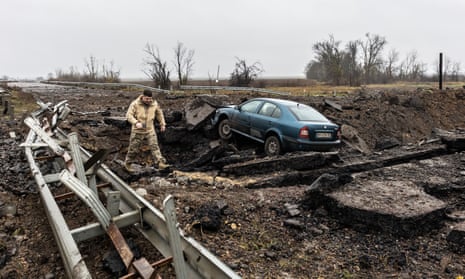More than 6m households in Ukraine are still affected by power cuts, two days after targeted Russian strikes on the country’s energy infrastructure, President Volodymyr Zelenskiy said. “As of this evening, blackouts continue in most regions [of Ukraine] and in Kyiv. In total, more than 6 million subscribers,” Zelensky said in his nightly address on Friday. The number of affected households had reduced “by half” since Wednesday. He said about 600,000 people were experiencing power cuts in Kyiv, the capital, with the Odessa, Lviv, Vinnytsia and Dnipropetrovsk regions also among the worst affected as temperatures approach freezing.
The European Union will step up efforts to provide Ukraine with support to restore and maintain power and heating, the head of the European Commission said on Friday. Ursula von der Leyen said in a statement after a phone call with Volodymyr Zelenskiy that the EU executive arm was preparing the delivery to Ukraine large donations from EU countries and from the EC’s reserves.
Russian shelling on the southern Ukrainian city of Kherson killed 15 civilians on Friday, officials said, as engineers across the country sought to restore heat, water and power to major cities. Several “private houses and high-rise buildings” had been damaged, city official Galyna Lugova also said. The shelling of Kherson, a key eastern city recently recaptured by Ukrainian forces, was the deadliest Russian bombardment in recent days. Yarovslav Yanushovich, head of the Kherson military administration, said Russian forces “opened fire on a residential area with multiple rocket launchers”.
Hungary’s President Katalin Novak is travelling to Kyiv to meet Volodymyr Zelenskiy, her Ukrainian counterpart, the website index.hu reported on Friday, adding that Novak would go by train via Poland. The Hungarian president’s office said it would neither deny nor confirm the information. Novak, a close ally of the nationalist prime minister Viktor Orban, would be the highest-ranking Hungarian politician to visit Zelenskiy since Russia’s invasion in February.
Ukraine’s leaders would have to be “far-sighted” to secure peace, Pope Francis said, suggesting Kyiv would have to make concessions to end the war with Russia. In an open letter released on Friday to mark the war’s nine-month anniversary, the pontiff praised the strength of Ukrainians in the face of the onslaught. “The world has recognised a bold and strong people, a people that suffers and prays, cries and struggles, resists and hopes: a noble and martyred people.”
Ukraine’s four nuclear power plants have been reconnected to the national power grid after completely losing off-site power earlier this week, the International Atomic Energy Agency said. The facilities were all disconnected from the grid on Wednesday for the first time in Ukrainian history after the latest wave of Russian air strikes on vital infrastructure. In a statement on Friday, the nuclear watchdog said Ukraine had informed it on Friday that its Rivne, South Ukraine and Khmelnytskyy plants had been reconnected. Ukraine reconnected its vast Zaporizhzhia plant on Thursday, Kyiv said earlier.
Armenia has asked the French president, Emmanuel Macron, to chair peace talks with Azerbaijan in a fresh challenge to Vladimir Putin’s increasingly loose grip on Russia’s regional allies in the wake of the war in Ukraine. The snub from a traditional ally to Putin comes immediately on the back of his disastrous summit with six former Soviet states.
EU diplomats were meeting on Friday night in an effort to reach a deal on a price level at which to cap Russian oil exports, according to a report by Bloomberg. European governments have failed so far to find an agreement ahead of a 5 December deadline. A G7 proposal for a cap of $65-$70 a barrel is seen as far too high by some, and too low by others.
Angela Merkel has insisted that her position as a lame duck in the last months of her time in office made it more or less impossible for her to influence the behaviour of Vladimir Putin. The former German chancellor appeared defensive and quietly defiant about her inability to change the course of the Russian president’s decision-making in the run-up to the invasion of Ukraine, telling German news magazine Spiegel she felt acutely aware that her ability to negotiate with Putin was minimal because it was known she would not stand for a fifth term.
The head of the Russian mercenary outfit Wagner, Yevgeny Prigozhin, has claimed a former US Marine general is working for the group. In response to a request for comment from Finnish newspaper Helsingin Sanomat, Prigozhin said on Friday: “There are not very many Finnish citizens in the Wagner PMC, about 20 people … They are fighting in a British battalion [as part of Wagner PMC] which is commanded by a US citizen, a former general of the Marine Corps,” Prigozhin said, as quoted by the press service of his company Concord.
Reuters and Agence France-Presse contributed to this report

Russia-Ukraine war at a glance: what we know on day 276 of the invasion
This article is more than 1 year old
More than 6m Ukrainian households still without power; EU to boost efforts to restore electricity and heating; Hungarian president to meet Zelenskiy
Explore more on these topics